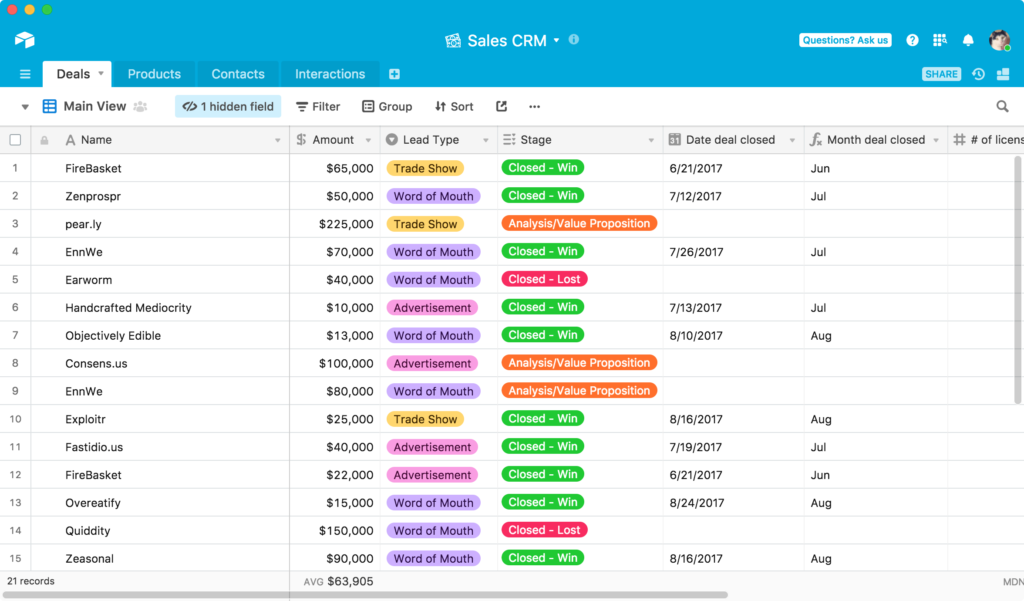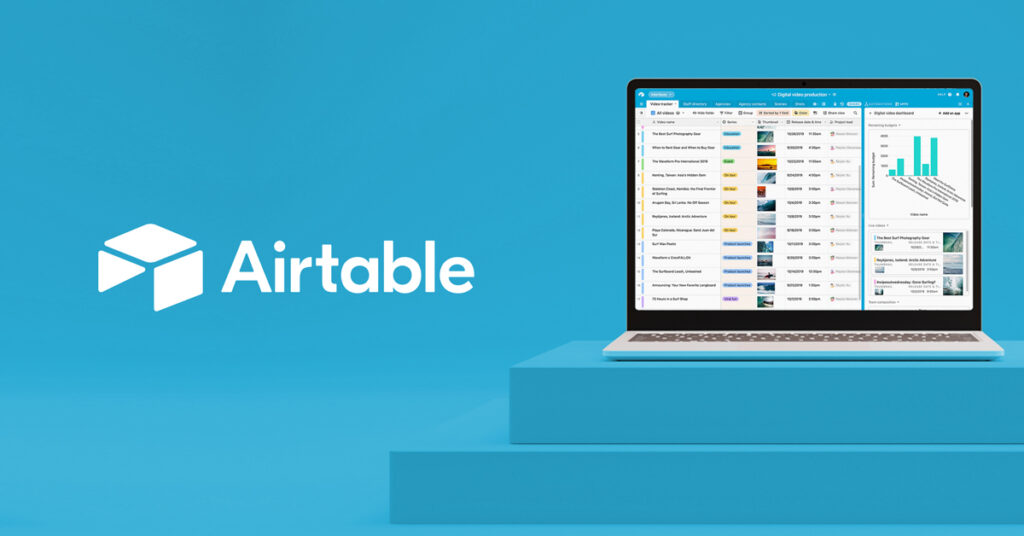Airtable is a cloud-based software startup that provides a collaborative database and spreadsheet platform for teams and organizations. The platform combines the flexibility of a spreadsheet with the power of a relational database to create a customizable and scalable solution for managing data, projects, and workflows.
Airtable was founded in 2013 by Howie Liu, Andrew Ofstad, and Emmett Nicholas, who were frustrated with the limitations of existing spreadsheet and database tools. The founders set out to create a new type of software that would enable people to organize their work and collaborate more effectively.
What does Airtable do?
Airtable combines the flexibility of a spreadsheet with the power of a relational database to help teams and organizations manage their data, projects, and workflows. Users can create customized applications and databases that fit their specific needs, with features such as custom views, filters, sorting, attachments, and integrations with other popular tools.
Airtable can be used for a wide range of purposes, including project management, content planning, customer relationship management, inventory tracking, and more. Users can choose from a variety of pre-built templates or create their own from scratch.

One of the key advantages of Airtable is its ease of use and flexibility. Users do not need technical expertise to create or modify their own data structures and workflows, which enables teams to quickly adapt to changing requirements and collaborate more efficiently. Airtable also offers a range of collaboration features, including real-time editing, commenting, and notifications.
Overall, Airtable is designed to be a more user-friendly and flexible alternative to traditional spreadsheet and database tools, with a focus on collaboration and customization. The platform is used by individuals, small businesses, and large enterprises across a wide range of industries.
History of Airtable
Airtable was founded in 2013 by Howie Liu, Andrew Ofstad, and Emmett Nicholas. The three co-founders met while working at a previous startup called Justin.tv, which later became Twitch, a popular video streaming platform.
The idea for Airtable arose from the founders’ frustration with existing spreadsheet and database tools, which they found to be limiting and inflexible. They believed that there was an opportunity to create a new type of software that would enable people to organize their work and collaborate more effectively.
To bring their vision to life, the founders began working on a prototype that combined the ease of use and flexibility of a spreadsheet with the power of a relational database. They wanted to create a platform that would allow users to organize their data in a way that made sense to them, without the need for technical expertise.
After several months of development, the founders launched a private beta of Airtable in 2013. The response was overwhelmingly positive, and the company quickly gained a following among startups and small businesses.
Airtable continued to grow and evolve, adding new features and integrations to make the platform more powerful and user-friendly. In 2015, the company raised $3 million in seed funding from investors including CRV and Freestyle Capital.
Since then, Airtable has experienced rapid growth and has become one of the most popular collaborative database and spreadsheet platforms on the market. The company has raised over $1.4 billion in funding to date and is valued at over $11 billion.
What is the business model of Airtable?
Airtable’s business model is based on a software-as-a-service (SaaS) subscription model. The company offers a freemium pricing structure, with a free plan that includes basic features and limited functionality, as well as several paid plans with more advanced features and additional capabilities.
Airtable’s paid plans are priced on a per-user, per-month basis, with different pricing tiers depending on the number of users and the features included. The company also offers enterprise plans for large organizations with specific needs and requirements.
In addition to its core platform, Airtable generates revenue through a range of add-ons and integrations with other popular tools and platforms. These include integrations with Zapier, Slack, and other productivity tools, as well as third-party apps that can be used to extend Airtable’s functionality.
Airtable also offers consulting and training services for organizations that need additional support and guidance in using the platform. These services are designed to help organizations optimize their workflows and get the most out of their investment in Airtable.
Overall, Airtable’s business model is focused on providing a flexible and scalable platform that meets the needs of a wide range of users and organizations, while generating revenue through a combination of subscription fees, add-ons, and services.
Airtable Funding and Investors
Airtable has received significant funding from several high-profile investors since its inception in 2013. Here are some of the key investors and funding rounds that Airtable has raised to date:
Seed Round: In 2015, Airtable raised $3 million in a Seed funding from investors that include Caffeinated Capital, Freestyle Capital, Data Collective, CrunchFund, Box Group, Bebo founder Michael Birch, Box executive Villi Iltchev, Ben Ling, Snapup founder Shan Mehta, Farmville creator Amitt Mahajan, Ashton Kutcher, OpenDoor founder Eric Wu, YC partner Aaron Harris and Color Genomics co-founder Othman Laraki.
Series A: In June 2015, Airtable raised $7.6 million in a Series A funding round led by Charles River Ventures, with participation from a host of angels, including Kevin Mahaffey (cofounder and CTO of Lookout). Hollywood celebrity and Silicon Valley angel investor Ashton Kutcher is also an investor.
Series B: In 2018, Airtable raised $60 million in a Series B funding round led by Caffeinated Capital and CRV.
Series C: In 2018, Airtable raised $100 million in a Series C funding led by Benchmark, Thrive Capital and Coatue Management at a post-money valuation of $1.1 billion.
Series F: In 2021, Airtable raised $735 million in a Series F funding round led by New York City-based XN, and it includes new investors Franklin Templeton, Salesforce Ventures and Michael Dell’s MSD Capital that boosts its valuation to $11 billion.
Also Read: How Brex is Empowering Startups with Tailored Financial Solutions
Future of Airtable
The future of Airtable looks promising, as the company continues to expand its offerings and improve its platform to meet the changing needs of its users. Here are some of the key areas of focus for Airtable’s future:
Continued growth: Airtable has experienced rapid growth in recent years, and the company is likely to continue to expand its user base as more organizations look for flexible and customizable tools to manage their data and workflows.
New features and capabilities: Airtable is constantly adding new features and capabilities to its platform, such as new templates, integrations, and collaboration tools. This will help the company stay ahead of the competition and meet the evolving needs of its users.
Deeper integrations: Airtable is likely to continue to deepen its integrations with other popular tools and platforms, making it easier for users to connect their workflows and data across multiple tools.
More automation: Airtable is already known for its automation capabilities, but the company is likely to expand this functionality in the future, making it even easier for users to streamline their workflows and save time.
Increased focus on enterprise customers: Airtable is likely to continue to focus on serving larger organizations with specific needs and requirements, such as security and compliance. This will help the company expand its customer base and generate more revenue.
Overall, the future of Airtable looks bright, as the company continues to innovate and improve its platform to meet the needs of its users. With a growing user base, new features and capabilities, and a focus on serving enterprise customers, Airtable is well-positioned for continued success in the years to come.
To read more content like this, subscribe to our newsletter
Go to the full page to view and submit the form.

